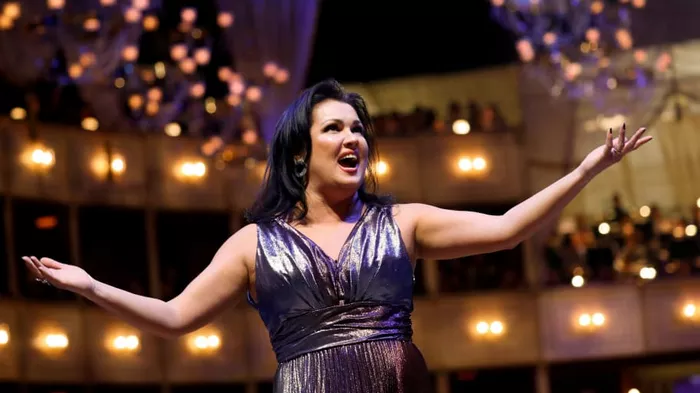In a stunning turn of events, internationally acclaimed soprano Anna Netrebko has embarked on a legal crusade, taking her battle to none other than The Metropolitan Opera. The repercussions of this bold move are reverberating throughout the classical music realm, thrusting into the spotlight a confluence of issues that stretch beyond mere artistic discord. This legal tussle unveils intricate layers of contractual intricacies, the nuances of artistic autonomy, and the ever-evolving landscape of the opera industry’s power dynamics.
The Artistic Diva: Anna Netrebko’s Journey to Stardom
Originating from the heart of Russia, Anna Netrebko’s journey from aspiring singer to operatic luminary is one that reads like a script from a grand opera itself. Her ascension to global eminence was the culmination of tireless devotion to her craft, countless hours of disciplined training, and an unrelenting passion to hone her skills. Netrebko’s astonishing capacity to seamlessly embody an array of roles with an unmatched authenticity and fervor earned her not just a place but a throne among the pantheon of opera’s elite.
The Metropolitan Opera: A Revered Institution Under Scrutiny
For generations, The Metropolitan Opera, affectionately dubbed the Met, has epitomized grandeur and artistic excellence. Its illustrious history as a cradle of musical brilliance and its reputation for fostering top-tier talents have cemented its status as an aspiration for operatic artists worldwide. Netrebko’s association with the Met seemed to be a match forged in the heavens, providing her with a colossal stage to showcase her vocal prowess and dramatic artistry.
A Sour Note: Clashes Over Contracts
However, beneath the glamour and applause, the harmony between Netrebko and the Met began to unravel due to a chorus of contractual discrepancies. Legal documents presented by Netrebko’s legal team shed light on allegations that the Met had faltered in upholding several crucial aspects of their binding agreement. These allegations have unveiled a labyrinth of contractual clauses, igniting a struggle between both parties to decipher the intricacies of their obligations and entitlements.
Artistic Autonomy vs. Directorial Vision
At the epicenter of this legal maelstrom lies the fundamental clash between an artist’s autonomy and the director’s vision. Supporters of Netrebko assert that her artistic expressions were stifled, curtailing her ability to fully channel her characters’ emotions. On the other side, the Met contends that opera, being inherently collaborative, demands a unifying directorial vision for a seamless production. This juncture raises questions about the extent to which artistic freedom can coexist with the cohesion of a collective artistic endeavor.
The Changing Landscape of Opera Economics
Beyond the personal conflicts, Netrebko’s legal proceedings cast a glaring spotlight on the shifting landscape of opera’s financial dynamics. In recent years, the industry has grappled with financial stressors stemming from dwindling ticket sales and the burgeoning popularity of alternative entertainment forms. These economic constraints have exerted pressure on both performers and institutions, compelling them to navigate the delicate equilibrium between preserving artistic integrity and ensuring fiscal viability.
Public Reaction and Industry Response
As expected, the opera community and the public at large are riveted by this unfolding legal drama. Divided opinions mirror the opera’s intricate harmonies, with some fervently supporting Netrebko’s quest for unbridled artistic expression, while others emphasize the inevitability of artistic compromises within collaborative works. The verdict of this lawsuit could set a precedent that ripples through the future interactions between performers and opera houses, reshaping the power dynamics of the operatic sphere.
The Path Forward: Mediation or Litigation?
As the legal saga unfolds, calls from various quarters for potential resolution through mediation have gained momentum. A negotiated settlement might potentially provide both Netrebko and the Met with the means to find common ground and address their grievances without protracted courtroom battles. Yet, if the case advances to the litigation stage, the ramifications could reverberate far beyond the confines of this specific dispute, influencing the structural contours of future contracts within the opera industry.
Conclusion
The legal battle waged by Anna Netrebko against The Metropolitan Opera serves as a poignant reminder of the intricate tapestry that encompasses the world of opera. Beyond the magnificent arias and dazzling sets lies a complex web of contractual obligations, artistic aspirations, and financial pressures. Regardless of the eventual legal outcome, this case stands as an enduring testament to the fact that even venerable institutions can find themselves enmeshed in legal wrangling with their brightest stars. The final note of this legal symphony is yet to be played, and its resonance will echo throughout the opera world for years to come, challenging established norms and redefining the boundaries of artistic collaboration.

